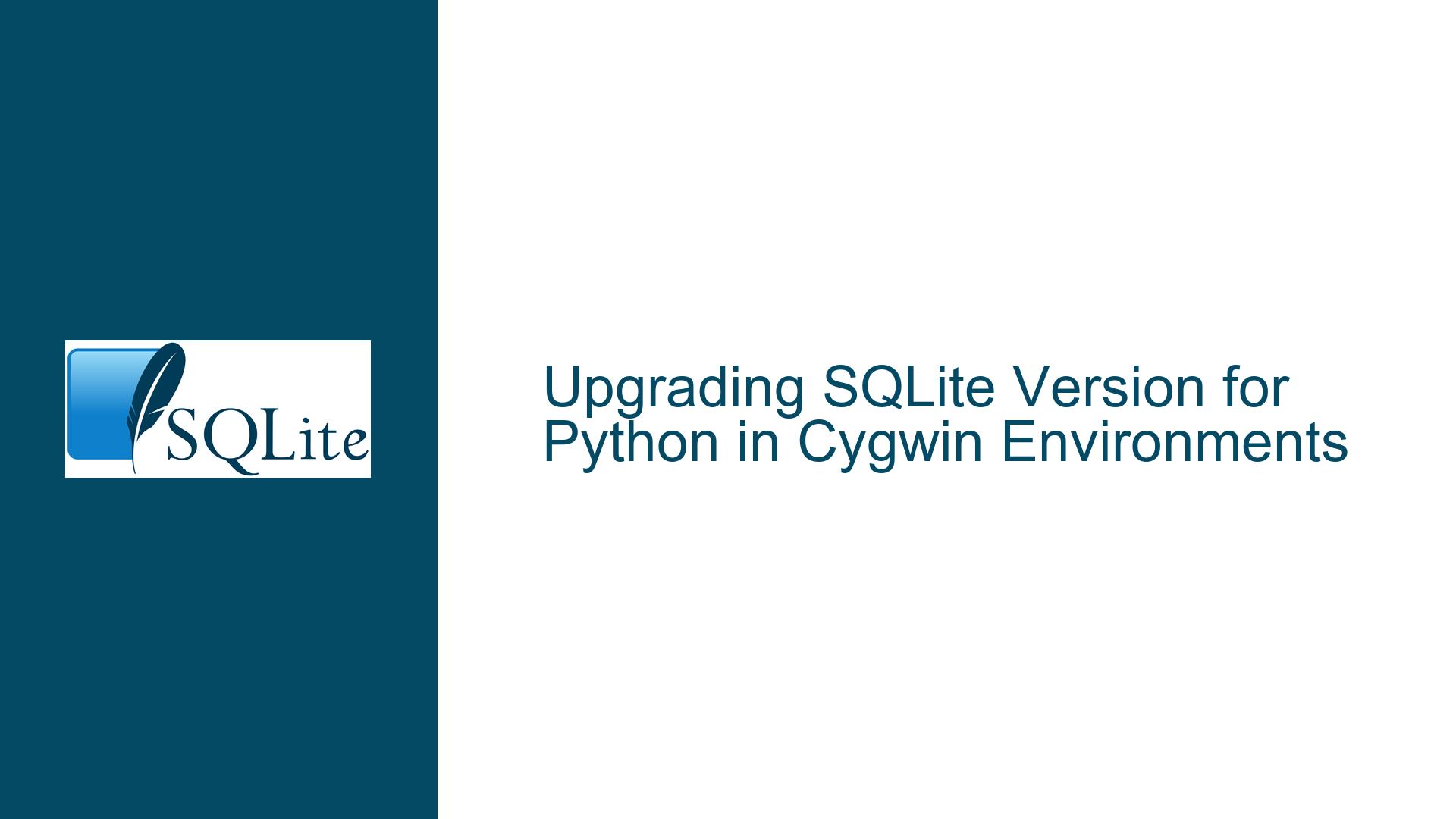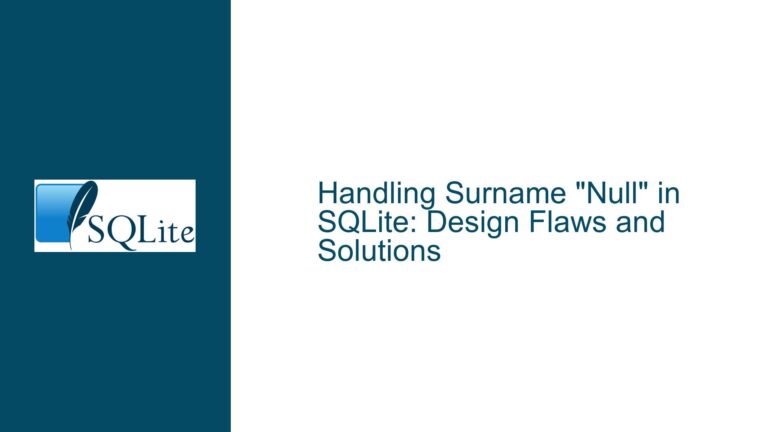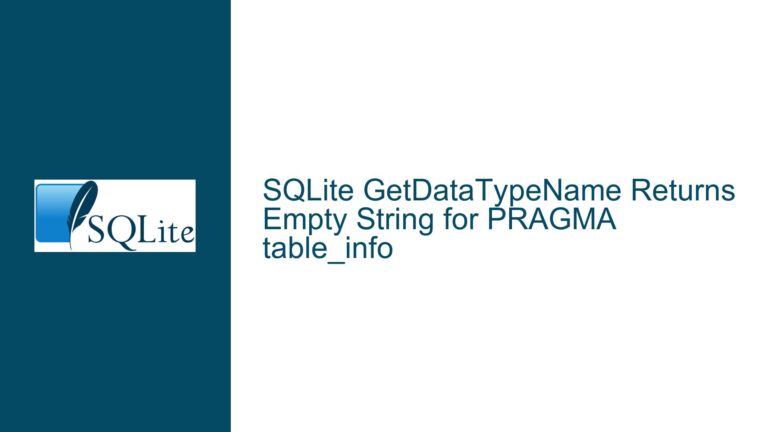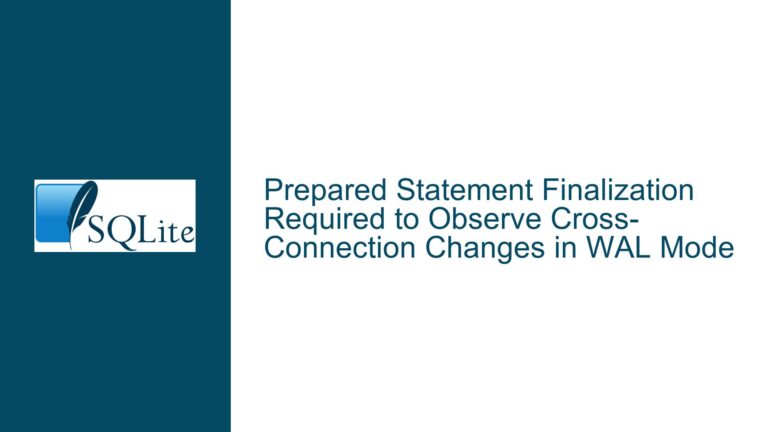Upgrading SQLite Version for Python in Cygwin Environments
Understanding Python’s SQLite Dependency Chain in Cygwin
Issue Overview
The core challenge involves ensuring that Python’s sqlite3 module within Cygwin uses a specific version of the SQLite shared library. By default, Python dynamically links to the SQLite library available in the system’s library paths. In Cygwin, Python packages are often compiled against the SQLite version provided by the Cygwin distribution repository. When attempting to override this dependency manually—such as by compiling and installing a newer SQLite version—conflicts arise if the Python interpreter continues to locate and load the older library. This discrepancy is exacerbated in Cygwin due to its hybrid Windows-Unix architecture, where shared library resolution follows Unix-like conventions but interacts with Windows filesystem nuances.
The user observed inconsistent behavior: two Cygwin installations successfully adopted the newer SQLite version after manual compilation, while a third installation failed. This inconsistency points to variations in library search paths, residual files from prior installations, or differences in environment configurations between Cygwin instances. The root issue revolves around how Cygwin’s dynamic linker resolves shared libraries at runtime and how Python binds to these libraries during module import.
Identifying Sources of SQLite Version Mismatch
Possible Causes
Multiple SQLite Shared Libraries in Library Paths
Cygwin’s filesystem hierarchy may contain multiple copies oflibsqlite3.dll(orcygsqlite3-0.dll) across directories like/usr/bin,/usr/lib,/usr/local/lib, or user-defined paths. If older versions persist in higher-priority directories, Python will load the first matching library during runtime, ignoring the newly compiled version.Incomplete Overwrite During Installation
Runningmake installafter compiling SQLite might fail to replace all instances of the library. For example, if the previous SQLite installation was managed via Cygwin’s package manager (setup-x86_64.exe), residual files in/usr/lib/sqlite3or/usr/includecould interfere.Python Module Hardcoding Library Paths
Thesqlite3module in Python might have been compiled with hardcoded paths to specific SQLite libraries during Python’s own build process. This is rare but possible if the Python package in Cygwin was built with static linking or explicitRPATHdirectives.Environment Variables Affecting Library Resolution
Cygwin uses environment variables likeLD_LIBRARY_PATHandPATHto resolve shared libraries. If these variables prioritize directories containing the older SQLite version, the newer installation will remain undetected.Cygwin’s Virtual Filesystem Layer
Cygwin translates Unix-style paths to Windows paths, which can lead to unexpected behavior when accessing system directories. For instance, a library installed to/usr/libmight map toC:\cygwin64\usr\lib, but conflicting permissions or symlinks could redirect to an outdated version.
Resolving Library Conflicts and Enforcing Version Consistency
Troubleshooting Steps, Solutions & Fixes
Step 1: Audit Installed SQLite Libraries
Begin by identifying all SQLite shared libraries in Cygwin’s filesystem. Use the find and cygcheck utilities:
find /usr -name "*sqlite3*" -exec ls -l {} \;
cygcheck -l python3.9 | grep sqlite3
This reveals libraries linked to Python and their locations. If older versions (e.g., 3.34.0) appear in /usr/bin or /usr/lib, they must be replaced or removed.
Step 2: Recompile SQLite with Explicit Installation Paths
When compiling SQLite from source, ensure --prefix=/usr is specified to overwrite system-wide files. However, Cygwin’s package manager might lock certain directories. To bypass this:
./configure --prefix=/usr/local/sqlite-custom
make
make install
Then, manually copy the new library to /usr/lib:
cp /usr/local/sqlite-custom/lib/libsqlite3.dll /usr/lib
Step 3: Adjust Dynamic Linker Configuration
Force the linker to prioritize the custom SQLite library by modifying /etc/ld.so.conf or creating a .conf file in /etc/ld.so.conf.d/:
/usr/local/sqlite-custom/lib
Run ldconfig to update the linker cache.
Step 4: Override Library Paths via Environment Variables
Prepend the custom SQLite library’s directory to LD_LIBRARY_PATH before launching Python:
export LD_LIBRARY_PATH="/usr/local/sqlite-custom/lib:$LD_LIBRARY_PATH"
python -c "import sqlite3; print(sqlite3.sqlite_version)"
Step 5: Verify Python’s Library Binding
Use strace to trace library calls during module import:
strace -e openat python3 -c "import sqlite3" 2>&1 | grep sqlite3
This shows which libsqlite3 file is opened. If the wrong library is loaded, revisit Steps 2–4.
Step 6: Rebuild Python with Updated SQLite Support
If all else fails, recompile Python after installing the new SQLite version. Download Python’s source, configure with --enable-loadable-sqlite-extensions, and ensure CPPFLAGS and LDFLAGS point to the custom SQLite:
export CPPFLAGS="-I/usr/local/sqlite-custom/include"
export LDFLAGS="-L/usr/local/sqlite-custom/lib"
./configure --prefix=/usr
make
make install
Final Validation
After applying these steps, confirm the SQLite version in Python:
python -c "import sqlite3; print(sqlite3.sqlite_version)"
If the output matches the desired version, the upgrade succeeded. If not, systematically re-examine library paths, environment variables, and file permissions.
This guide addresses the intricacies of Cygwin’s library management and Python’s dependency resolution, ensuring robust version control for SQLite integrations.






